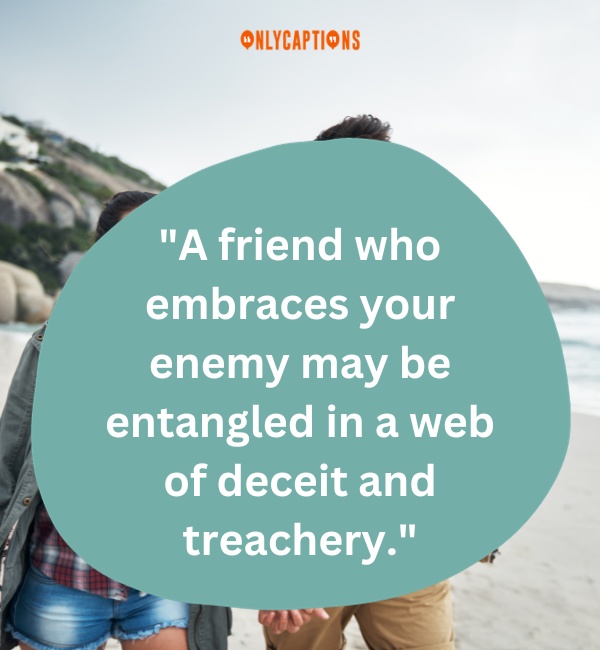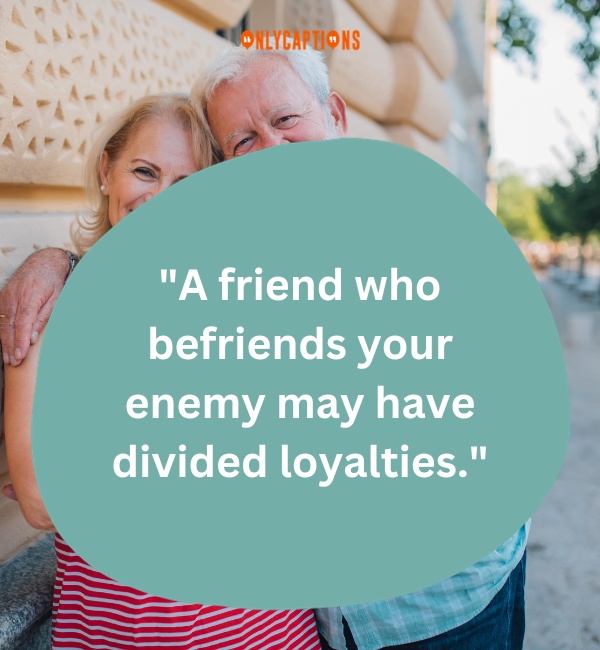So, here's the deal. We've all been there at some point—feeling the sting of betrayal when someone we trusted turned out to be friends with our enemy. It's like that gut punch you never see coming, right? The phrase "never trust someone who is friends with your enemy" has been tossed around in countless conversations, books, and even movies. But what does it really mean? Why does this idea resonate so deeply with us? Stick around, because we're about to dive deep into this topic and uncover its layers.
This saying isn't just a catchy phrase; it's a reflection of human nature, relationships, and the complexities of trust. Think about it—trust is the foundation of every bond we form, whether it's with friends, family, or colleagues. But what happens when that trust is shaken? It’s not just about feeling hurt; it's about questioning your judgment and reevaluating the people in your life. That's why understanding this concept is so important.
In this article, we'll explore the meaning behind these words, how they apply to real-life situations, and why they matter so much. We'll also look into some powerful quotes that shed light on this topic and offer wisdom for navigating tricky relationships. So, buckle up, because we’re about to take a journey through the world of trust, betrayal, and friendship.
Read also:Iana Victory Pose The Ultimate Guide To Her Iconic Moment
What Does "Never Trust Someone Who Is Friends With Your Enemy" Really Mean?
Alright, let's break it down. The phrase "never trust someone who is friends with your enemy" isn't just a warning; it's a statement about loyalty and trust. At its core, it suggests that if someone aligns themselves with someone you consider an enemy, their loyalty to you might be questionable. Think of it like this—if your best friend starts hanging out with the person who ghosted you or betrayed your trust, you can't help but feel uneasy, can you?
This saying has roots in ancient wisdom, appearing in various forms across cultures. For instance, Aristotle once said, "A friend to all is a friend to none," which aligns perfectly with this idea. The concept is simple yet profound: true friends stand by you, even when the going gets tough. If they're cozying up to your enemy, it raises red flags about their intentions.
But here's the kicker—it's not always black and white. Sometimes, people have complex relationships that don't fit neatly into categories. Maybe your "enemy" isn't as bad as you think, or maybe the person you're questioning has reasons for their actions. That's why it's essential to approach this idea with nuance and understanding. Let's explore this further in the next section.
Why Trust Matters in Relationships
Trust is the glue that holds relationships together. Without it, everything falls apart. Whether it's a friendship, romantic partnership, or professional relationship, trust is the foundation that keeps things stable. When someone betrays that trust, it shakes the very core of the bond you share.
Let me give you an example. Imagine you're working on a big project with a colleague, and you discover they're secretly collaborating with a rival team. How would that make you feel? Betrayed, right? It's the same principle when it comes to personal relationships. If someone you trust is buddying up with your enemy, it's natural to feel hurt and suspicious.
But here's the thing—trust isn't just about avoiding betrayal. It's about building a relationship where both parties feel safe and supported. When trust is broken, it takes time and effort to rebuild it. That's why being cautious about who you trust is so important.
Read also:Chris Colfer Viral Tiktok How The Star Shines Brighter Than Ever
Key Signs Someone Might Be Untrustworthy
- They consistently break promises or commitments.
- They gossip about others behind their backs.
- They have a history of betrayal or dishonesty.
- They prioritize others over you, especially when it involves conflict.
- They lack transparency in their actions and decisions.
These signs aren't foolproof, but they can help you identify potential red flags in a relationship. Remember, trust is earned, not given blindly. It's okay to be cautious, especially when someone's actions raise concerns.
Powerful Quotes About Trust and Betrayal
Quotes have a way of distilling complex ideas into simple, memorable phrases. Here are some powerful quotes that shed light on the concept of trust and betrayal:
"Beware the man who is not your friend." – Unknown
This one sums up the essence of our topic perfectly. If someone isn't truly on your side, their intentions might not be aligned with yours.
"It is easier to forgive an enemy than to forgive a friend." – William Blake
Blake hits the nail on the head here. Betrayal from a friend stings deeper than enmity from an enemy because we expect loyalty from those we trust.
"Trust is like paper, once crumpled it can never be perfect again." – Unknown
This metaphor perfectly captures the fragility of trust. Once broken, it's difficult to restore it completely.
How These Quotes Apply to Real Life
These quotes aren't just pretty words; they offer practical wisdom for navigating relationships. For instance, if you find yourself questioning someone's loyalty, these quotes can help you evaluate the situation more clearly. They remind us that trust is precious and should be guarded carefully.
Understanding the Psychology of Betrayal
Betrayal isn't just an emotional experience; it's also a psychological one. When someone we trust betrays us, it triggers a range of emotions, from anger and sadness to confusion and self-doubt. But why does it hurt so much? The answer lies in how our brains process relationships.
Humans are wired for connection. We form bonds with others to feel safe and supported. When those bonds are broken, it creates a sense of instability and uncertainty. That's why betrayal feels so devastating—it disrupts our sense of security and forces us to reevaluate our relationships.
But here's the good news—psychologists suggest that betrayal can also be a catalyst for personal growth. It forces us to reflect on our values, boundaries, and expectations in relationships. By learning from these experiences, we can become more resilient and discerning in the future.
Steps to Heal After Betrayal
- Allow yourself to feel the emotions without judgment.
- Reflect on what went wrong and what you can learn from it.
- Set clear boundaries to protect yourself moving forward.
- Seek support from trusted friends or professionals if needed.
Healing from betrayal isn't easy, but it's possible. By taking these steps, you can rebuild your sense of trust and move forward with confidence.
Can Trust Be Restored After Betrayal?
This is the million-dollar question, isn't it? Can trust be restored after someone betrays you? The answer is yes—but it's not always simple. Restoring trust requires effort from both parties and a willingness to work through the issues.
Here are some key factors that contribute to rebuilding trust:
- Sincerity: The person who betrayed you must show genuine remorse and a commitment to change.
- Time: Healing takes time, and rushing the process can lead to further hurt.
- Communication: Open and honest communication is essential for addressing concerns and rebuilding trust.
- Consistency: Actions must align with words; promises must be kept, and commitments must be fulfilled.
While it's possible to restore trust, it's important to prioritize your own well-being in the process. If the person who betrayed you isn't willing to put in the effort, it might be time to reevaluate the relationship.
How to Identify True Friends
Now that we've talked about betrayal, let's focus on the flip side—how to identify true friends. True friends are rare gems, and recognizing them is crucial for building meaningful relationships.
Here are some signs of a true friend:
- They support you unconditionally, even when times are tough.
- They respect your boundaries and honor your trust.
- They celebrate your successes and comfort you in your failures.
- They offer constructive feedback and help you grow as a person.
- They have your best interests at heart, always.
True friends aren't perfect, but they consistently show up for you in meaningful ways. By surrounding yourself with these kinds of people, you create a support system that strengthens your resilience and well-being.
Why Loyalty Matters in Friendship
Loyalty is the backbone of any strong friendship. It means standing by someone even when it's difficult, being honest even when it's uncomfortable, and showing up even when it's inconvenient. Loyalty isn't about perfection; it's about consistency and reliability.
When you have loyal friends, you know you can count on them no matter what. They're the people who stick around through thick and thin, and their presence in your life is a gift. Cultivating loyalty in your friendships is one of the best ways to build trust and deepen your connections.
Dealing With Enemies in Your Life
No one likes to talk about enemies, but the truth is, we all encounter people who challenge us or cause conflict. The key is how we handle these situations. When someone becomes your enemy, it's natural to feel protective of your relationships and cautious about who you trust.
Here are some strategies for dealing with enemies:
- Stay calm and composed, even when provoked.
- Focus on your own growth and success rather than their actions.
- Surround yourself with positive influences who uplift and support you.
- Set clear boundaries to protect your energy and well-being.
Remember, not everyone is meant to be in your life. Some people come and go, and that's okay. What matters most is how you handle these situations with grace and integrity.
Final Thoughts: Navigating Trust and Betrayal
We've covered a lot of ground in this article, from understanding the meaning of "never trust someone who is friends with your enemy" to exploring the complexities of trust, betrayal, and friendship. The bottom line is this: trust is precious, and it should be handled with care.
By being mindful of who you trust and setting clear boundaries, you can protect yourself from unnecessary pain and heartache. At the same time, it's important to approach relationships with an open heart and a willingness to forgive when appropriate.
So, what's next? Take a moment to reflect on your own experiences with trust and betrayal. Think about the lessons you've learned and how you can apply them moving forward. And don't forget to share this article with others who might benefit from the insights we've discussed!
Table of Contents
- What Does "Never Trust Someone Who Is Friends With Your Enemy" Really Mean?
- Why Trust Matters in Relationships
- Powerful Quotes About Trust and Betrayal
- Understanding the Psychology of Betrayal
- Can Trust Be Restored After Betrayal?
- How to Identify True Friends
- Dealing With Enemies in Your Life
- Final Thoughts: Navigating Trust and Betrayal


